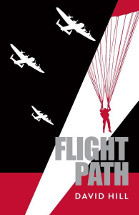Flight path by David Hill

Penguin Random House, 2017. ISBN 9780143770527
(Age: 14+) Recommended. Towards the end of World War II, in the
weeks prior to the Allied invasion of Europe, a crew assembles to
fly a mighty Lancaster bomber over Germany.
Eighteen year old Jack and some fellow New Zealanders are crewed
with an Australian, a Pole and an English pilot and the reader is
taken on their fearful journey from being assigned to a squadron to
flying their first operations.
This is a first rate story comprising genuine characters behaving
realistically under trying circumstances within a narrative
framework based on excellent research. The military service of New
Zealanders is seldom encountered in Australian literature beyond the
World War I ANZAC experience and it is refreshing to read this
historically accurate presentation.
Crews serving in the Royal Air Force's Bomber Command suffered
appallingly with a 44 percent death rate from falling to enemy fighters,
flak and flying accidents. Jack and his mates understand the
importance of their service, especially in terms of destroying the
launching pads for the V1 and V2 unmanned rockets or flying bombs
which caused massive and indiscriminate casualties and destruction
in British cities.
This is not a simplistic war story depicting heroes defeating an
evil enemy however. The Allied crew members reveal complex
perspectives concerning their role in the war. Stefan, the Polish
co-pilot harbours a deep hatred for all Germans after his sisters
were brutalised and his family murdered. Other airmen acknowledge
that decent German people suffer similarly for opposing the regime.
Jack, as the bomb aimer, is tormented in the knowledge that the bombs
he drops will possibly kill innocent civilians including women and
children. The author avoids allowing both the crew and the reader to
have parochial blinkers by creating an unavoidable situation.
Manning one of the Lancaster's machine guns, Jack defends the
aircraft against an enemy fighter and must reconcile having
personally killed the pilot beyond doubt. Other incidents in the
book also carefully prompt consideration of the value of human life
on a level which surpasses mere identification of which nation's
uniform is worn.
Off duty moments are portrayed realistically with the crews being
exhausted, anxious and bored and a romantic interest helps maintain
an optimistic faith that life will return to normal in the near
future.
This author is to be commended for writing a worthy story which
understands and respects the heroic airmen who showed immense
courage and fortitude flying in operations over Germany. Sadly their
service was not acknowledged by the British Military to the degree
that it ought to have been after the war.
Rob Welsh